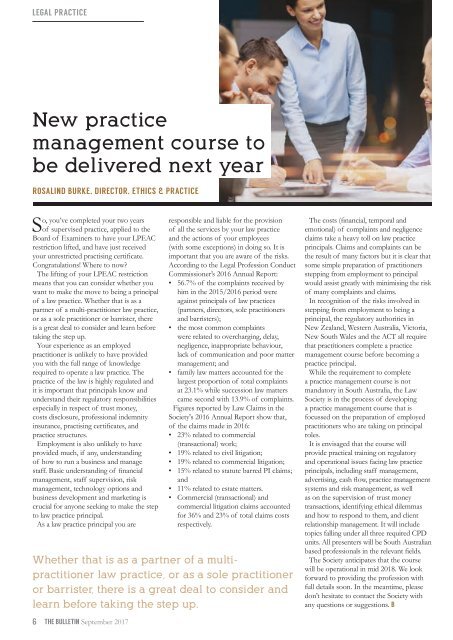LSB September 2017
You also want an ePaper? Increase the reach of your titles
YUMPU automatically turns print PDFs into web optimized ePapers that Google loves.
LEGAL PRACTICE<br />
New practice<br />
management course to<br />
be delivered next year<br />
ROSALIND BURKE, DIRECTOR, ETHICS & PRACTICE<br />
So, you’ve completed your two years<br />
of supervised practice, applied to the<br />
Board of Examiners to have your LPEAC<br />
restriction lifted, and have just received<br />
your unrestricted practising certificate.<br />
Congratulations! Where to now?<br />
The lifting of your LPEAC restriction<br />
means that you can consider whether you<br />
want to make the move to being a principal<br />
of a law practice. Whether that is as a<br />
partner of a multi-practitioner law practice,<br />
or as a sole practitioner or barrister, there<br />
is a great deal to consider and learn before<br />
taking the step up.<br />
Your experience as an employed<br />
practitioner is unlikely to have provided<br />
you with the full range of knowledge<br />
required to operate a law practice. The<br />
practice of the law is highly regulated and<br />
it is important that principals know and<br />
understand their regulatory responsibilities<br />
especially in respect of trust money,<br />
costs disclosure, professional indemnity<br />
insurance, practising certificates, and<br />
practice structures.<br />
Employment is also unlikely to have<br />
provided much, if any, understanding<br />
of how to run a business and manage<br />
staff. Basic understanding of financial<br />
management, staff supervision, risk<br />
management, technology options and<br />
business development and marketing is<br />
crucial for anyone seeking to make the step<br />
to law practice principal.<br />
As a law practice principal you are<br />
6<br />
THE BULLETIN <strong>September</strong> <strong>2017</strong><br />
responsible and liable for the provision<br />
of all the services by your law practice<br />
and the actions of your employees<br />
(with some exceptions) in doing so. It is<br />
important that you are aware of the risks.<br />
According to the Legal Profession Conduct<br />
Commissioner’s 2016 Annual Report:<br />
• 56.7% of the complaints received by<br />
him in the 2015/2016 period were<br />
against principals of law practices<br />
(partners, directors, sole practitioners<br />
and barristers);<br />
• the most common complaints<br />
were related to overcharging, delay,<br />
negligence, inappropriate behaviour,<br />
lack of communication and poor matter<br />
management; and<br />
• family law matters accounted for the<br />
largest proportion of total complaints<br />
at 23.1% while succession law matters<br />
came second with 13.9% of complaints.<br />
Figures reported by Law Claims in the<br />
Society's 2016 Annual Report show that,<br />
of the claims made in 2016:<br />
• 23% related to commercial<br />
(transactional) work;<br />
• 19% related to civil litigation;<br />
• 19% related to commercial litigation;<br />
• 15% related to statute barred PI claims;<br />
and<br />
• 11% related to estate matters.<br />
• Commercial (transactional) and<br />
commercial litigation claims accounted<br />
for 36% and 23% of total claims costs<br />
respectively.<br />
Whether that is as a partner of a multipractitioner<br />
law practice, or as a sole practitioner<br />
or barrister, there is a great deal to consider and<br />
learn before taking the step up.<br />
The costs (financial, temporal and<br />
emotional) of complaints and negligence<br />
claims take a heavy toll on law practice<br />
principals. Claims and complaints can be<br />
the result of many factors but it is clear that<br />
some simple preparation of practitioners<br />
stepping from employment to principal<br />
would assist greatly with minimising the risk<br />
of many complaints and claims.<br />
In recognition of the risks involved in<br />
stepping from employment to being a<br />
principal, the regulatory authorities in<br />
New Zealand, Western Australia, Victoria,<br />
New South Wales and the ACT all require<br />
that practitioners complete a practice<br />
management course before becoming a<br />
practice principal.<br />
While the requirement to complete<br />
a practice management course is not<br />
mandatory in South Australia, the Law<br />
Society is in the process of developing<br />
a practice management course that is<br />
focussed on the preparation of employed<br />
practitioners who are taking on principal<br />
roles.<br />
It is envisaged that the course will<br />
provide practical training on regulatory<br />
and operational issues facing law practice<br />
principals, including staff management,<br />
advertising, cash flow, practice management<br />
systems and risk management, as well<br />
as on the supervision of trust money<br />
transactions, identifying ethical dilemmas<br />
and how to respond to them, and client<br />
relationship management. It will include<br />
topics falling under all three required CPD<br />
units. All presenters will be South Australian<br />
based professionals in the relevant fields.<br />
The Society anticipates that the course<br />
will be operational in mid 2018. We look<br />
forward to providing the profession with<br />
full details soon. In the meantime, please<br />
don’t hesitate to contact the Society with<br />
any questions or suggestions. B


















